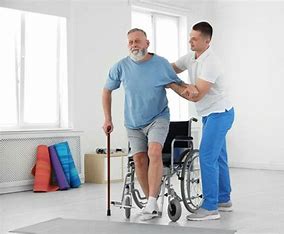
Stroke, also known as a cerebrovascular accident (CVA), occurs when blood flow to a part of the brain is interrupted or reduced, depriving brain tissue of oxygen and nutrients. This can cause brain cells to die within minutes.
It is is a very common health condition in Kenya, and worldwide.
You may have come across an individual suffering from stroke either from your family, neighborhood or even a friend.
There are two main types of strokes:
- Ischemic Stroke: This is the most common type, accounting for about 87% of all strokes. It occurs when a blood clot blocks or narrows an artery leading to the brain. These clots can form in the arteries within the brain or travel from other parts of the body (such as from the heart).
- Hemorrhagic Stroke: This occurs when a blood vessel in the brain bursts, leading to bleeding in or around the brain. Causes can include high blood pressure, aneurysms, or arteriovenous malformations (AVMs).
Symptoms of Stroke
Symptoms can vary depending on the part of the brain affected, but common signs include:
- Sudden numbness or weakness in the face, arm, or leg, especially on one side of the body.
- Sudden confusion, trouble speaking, or difficulty understanding speech.
- Sudden trouble seeing in one or both eyes.
- Sudden trouble walking, dizziness, loss of balance, or lack of coordination.
- Sudden severe headache with no known cause.
FAST: Stroke Recognition
The acronym FAST helps remember the warning signs of a stroke:
- Face drooping: One side of the face droops or is numb.
- Arm weakness: One arm is weak or numb.
- Speech difficulty: Speech is slurred, or the person is unable to speak or hard to understand.
- Time to call emergency services: If any of these symptoms are present, call emergency services immediately.
Risk Factors
Risk factors for stroke include:
- High blood pressure
- Smoking
- Diabetes
- High cholesterol
- Obesity
- Sedentary lifestyle
- Heart disease
- Family history of stroke
- Age (risk increases with age)
- Gender (men have a higher risk, but women are more likely to die from stroke)
- Race (African Americans have a higher risk of death from stroke)
Now, do you have a family member, friend or relative suffering from stroke and you are wondering on how to assist them? worry no more because at hellodaktari we are able to assist your patient, this is through our home based care services which includes physiotherapy, speech therapy, medical examination, psychology counselling, nutrition and counselling services among many others.
All you need to do is book an appointment with us on https://hellodaktari.co.ke and we shall be able to assist you. We also do offer online medical services.
Prevention
Preventive measures include:
- Managing blood pressure
- Quitting smoking
- Controlling diabetes
- Eating a healthy diet
- Exercising regularly
- Maintaining a healthy weight
- Limiting alcohol intake
- Managing heart conditions
Treatment
If you suspect someone is having a stroke, act quickly and seek medical attention immediately. The faster a stroke is treated, the better the chances of recovery. Book a one on one with us on our website https://hellodaktari.co.ke and we shall assist you.
Top of Form
Bottom of Form
